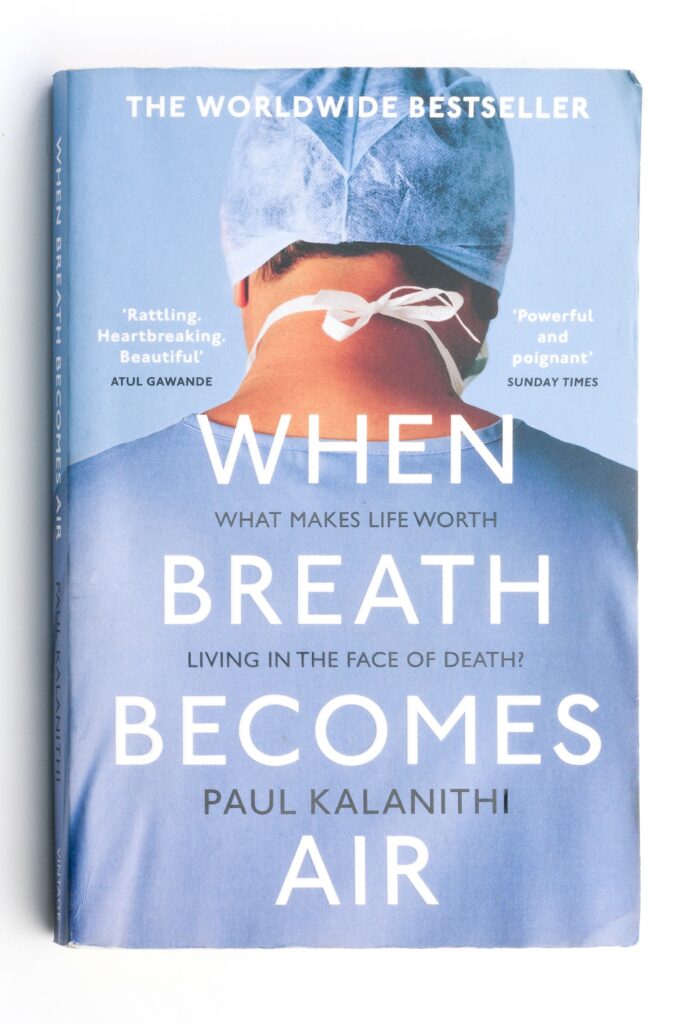
I had read this book a few months back and I read the last 2 chapters again this morning. The news of close friends and family members falling sick was making me anxious and yet ironically I felt that reading the autobiography of a talented neurosurgeon – Paul Kalanithi who died at a very young age from cancer will give me peace. And it sure did.
It’s quite emotional, heart-breaking but also a profound and inspiring story of a remarkable man. It’s a book about embracing the reality of death which teaches you how to be alive, being strongest in your weakest moments, and fighting the ultimate survivor battle with courage, despite losing your breaths. It’s a memoir of hope and will leave you teary-eyed. I can’t recommend it enough.
We all know that we will eventually face death, some sooner than later. And yet, we spend most of our life in constant denial, living on autopilot, planning about our unseen future, ranting about our expired past. We keep procrastinating things that are important to us, our real goals and dreams believing that we still have ample time.
But what if you don’t?
What if you had 1 year, 1 month, 1 week, 1 day to be alive?
What if like Paul you were diagnosed with a terminal illness and you didn’t know how long you will be alive and in what state of health?
How would you come to terms with a future that is not going to happen?
How would it alter your priorities and idea of life?
What would make life worth living in those circumstances?
This resonated much more with me as Paul was diagnosed with cancer when he was 36 years old (I’m 33) and died within 2 years. Paul was really driven. He tried to live each day to the best of his ability and helped many along his journey and after via this book. It also made me realize how unfair, uncertain, and fragile life is. At one end, he is finally graduating as a neurosurgeon after years of hard work, becoming a father but at the same time, his whole world is collapsing. Yet, he doesn’t portray himself as a victim or demands any sympathy.
What makes this special was the fact that Paul was always interested in death as a philosophical problem. One of the reasons he became a doctor was to understand how people make sense of their lives and deaths. But he soon discovered that no matter how close he was to his patients during his illness, he could never grasp the true meaning of their suffering since he was never in their shoes! And then when it suddenly happened to him, he realized how hard and intense it is.
He was not afraid of dying and Lucy (his wife) was not afraid to see him die which is incredibly brave. Cancer caused havoc in their life and it took everything they had to cope. But through it they could ultimately find meaning, which was amazing.
Another remarkable decision was when they decided to start a family. It was clear to them that the child wouldn’t be able to spend much time with Paul and Lucy would be a single parent. Even though Paul was running out of time, he left the decision to Lucy as she would be the one raising their child alone while taking care of Paul. While Lucy wanted Paul to be able to spend the remainder of his time in the way that he wanted to. She worried that having a kid would make goodbye more painful. To which Paul responded, “Wouldn’t it be great if it did?”. They believed that life was not about avoiding suffering but rather about creating meaning.
Lucy’s epilogue will leave you in tears. Interestingly, Lucy has the writing chops which Paul always strived for. Her storytelling and ability to convey emotions are incredible and certainly the most beautifully written part of the book. I can’t wait to read her future writings.
Above all, this book opens our eyes to our mortality and reminds us that our time here is limited. It urges you to truly savor the moment we are living right now and to reflect back into your priorities. It also teaches you the power of unconditional love and affection of family in reducing the greatest pain and suffering. And that life shouldn’t be measured in years but rather in the valuable and immortal memories.
It’s written by a remarkable man who chose to share his learnings when he had very limited time left on earth. Just having that courage is praise-worthy.
“Human knowledge is never contained in one person. It grows from the relationships we create between each other and the world, and still it is never complete.”
Paul Kalanithi
Heart touching. Will love to read the book as soon as I get time.